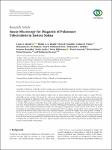Smear Microscopy for Diagnosis of Pulmonary Tuberculosis in Eastern Sudan
Shuaib, Yassir A.
Khalil, Eltahir A. G.
Schaible, Ulrich E.
Wieler, Lothar H.
Bakheit, Mohammed A. M.
Mohamed-Noor, Saad E.
Abdalla, Mohamed A.
Homolka, Susanne
Andres, Sönke
Hillemann, Doris
Lonnroth, Knut
Richter, Elvira
Niemann, Stefan
Kranzer, Katharina
Background. In Sudan, tuberculosis diagnosis largely relies on clinical symptoms and smear microscopy as in many other low- and middle-income countries. The aim of this study was to investigate the positive predictive value of a positive sputum smear in patients investigated for pulmonary tuberculosis in Eastern Sudan. Methods. Two sputum samples from patients presenting with symptoms suggestive of tuberculosis were investigated using direct Ziehl-Neelsen (ZN) staining and light microscopy between June to October 2014 and January to July 2016. If one of the samples was smear positive, both samples were pooled, stored at −20°C, and sent to the National Reference Laboratory (NRL), Germany. Following decontamination, samples underwent repeat microscopy and culture. Culture negative/contaminated samples were investigated using polymerase chain reaction (PCR). Results. A total of 383 samples were investigated. Repeat microscopy categorized 123 (32.1%) as negative, among which 31 were culture positive. This increased to 80 when PCR and culture results were considered together. A total of 196 samples were culture positive, of which 171 (87.3%), 14 (7.1%), and 11 (5.6%) were M. tuberculosis, M. intracellulare, and mixed species. Overall, 15.6% (57/365) of the samples had no evidence of M. tuberculosis, resulting in a positive predictive value of 84.4%. Conclusions. There was a discordance between the results of smear microscopy performed at local laboratories in the Sudan and at the NRL, Germany; besides, a considerable number of samples had no evidence of M. tuberculosis. Improved quality control for smear microscopy and more specific diagnostics are crucial to avoid possible overtreatment.
Dateien zu dieser Publikation

